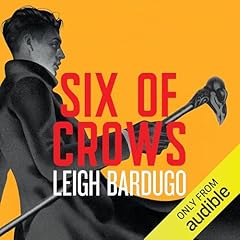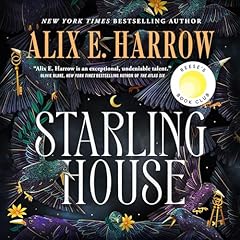
The Language of Thorns
Midnight Tales and Dangerous Magic
No se pudo agregar al carrito
Add to Cart failed.
Error al Agregar a Lista de Deseos.
Error al eliminar de la lista de deseos.
Error al añadir a tu biblioteca
Error al seguir el podcast
Error al dejar de seguir el podcast
 Exclusivo para miembros Prime: ¿Nuevo en Audible? Obtén 2 audiolibros gratis con tu prueba.
Exclusivo para miembros Prime: ¿Nuevo en Audible? Obtén 2 audiolibros gratis con tu prueba.Compra ahora por $17.50
-
Narrado por:
-
Lauren Fortgang
-
De:
-
Leigh Bardugo
Inspired by myth, fairy tale, and folklore, number one New York Times best-selling author Leigh Bardugo has crafted a deliciously atmospheric collection of short stories filled with betrayals, revenge, sacrifice, and love.
Enter the Grishaverse.... Love speaks in flowers. Truth requires thorns.
Travel to a world of dark bargains struck by moonlight, of haunted towns and hungry woods, of talking beasts and gingerbread golems, where a young mermaid's voice can summon deadly storms, and where a river might do a lovestruck boy's bidding but only for a terrible price.
Perfect for new listeners and dedicated fans, the tales in The Language of Thorns will transport you to lands both familiar and strange - to a fully realized world of dangerous magic that millions have visited through the novels of the Grishaverse.
©2017 Leigh Bardugo (P)2017 Audible, Inc.Los oyentes también disfrutaron:




















Featured Article: Mal Oretsev—A Shadow and Bone Character Guide
If you've listened to the Shadow and Bone series by Leigh Bardugo, you should be extremely familiar with Alina Starkov. Less is known about her childhood BFF and potential love interest, Malyen "Mal" Oretsev, a member of the First Army and a gifted tracker. With the release of the Netflix adaptation of the first novel, Shadow and Bone, viewers learned more about Mal than they did in the novels. So who is Mal Oretsev, and how does he fit in the Grishaverse?
Las personas que vieron esto también vieron:














I like the writing style
Se ha producido un error. Vuelve a intentarlo dentro de unos minutos.
Ayama and the Thorn Wood: 5/5 Beauty and the Minotaur myth blended together. Loved this story!
The Too-Clever Fox: 4/5 You really need to listen to/read this one, just fantastic!
The Witch of Duva: 5/5 The short story, The Witch of Duva, is an interesting folk story about a town where the girls are told to avoid the woods because any that wander into the woods will be eaten, by what, well, they don't really know, it could be a bear, a monster, a wolf, or even, dare I say, A Witch? That's about all you'll get out of me on this story because I don't want to ruin it, just know that the ending is not what you will be expecting. My favorite from this collection.
Little Knife: 3/5 This one was okay, not amazing but not awful either.
The Soldier Prince: 4/5 While I liked the story, it was a bit boring for me, but it is worth the listen.
When Water Sang Fire: 5/5 Took me a little bit to get into it but once it took hold, I was dragged along unable to let go.
I must not forget to talk about the most awesome narrator in the Audible universe: Lauren Fortgang, she brings every character to life and engages the reader, bringing them deep into the story until they forget where they really are because now, they are in the world Lauren has spoken into being. Trust me on this, any book she narrates is amazing.
Wonderful Short Stories
Se ha producido un error. Vuelve a intentarlo dentro de unos minutos.
Nice to have all the stories in one place.
Se ha producido un error. Vuelve a intentarlo dentro de unos minutos.
Interesting
Se ha producido un error. Vuelve a intentarlo dentro de unos minutos.
loved it
Se ha producido un error. Vuelve a intentarlo dentro de unos minutos.



